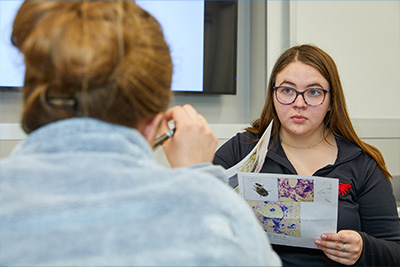The Pre-Veterinary Technology program at Northeast Community College is designed for students who plan to apply to our selective Veterinary Technology program (See selective admission process). This Associate of Science degree provides the foundational coursework needed for entry into the Vet Tech program, while also preparing students for a range of careers in animal health and science.
During the first semester, students complete a set of required courses and go through a formal selection process. If accepted, they transition into the Associate of Applied Science in Veterinary Technology. For those not immediately selected, this degree offers a valuable path—enhancing their qualifications for future application cycles, preparing them for related roles in the animal care field, or laying the groundwork for transfer to a four-year institution in a related area of study.
Note: This program does not lead to licensure as a veterinary technician and is not intended for those pursuing a Doctor of Veterinary Medicine (DVM) degree.
Why Students Choose This Program
This program is designed as a gateway into Northeast’s exceptional Veterinary Technology program—known for its experienced faculty, high job placement rates, and rigorous, hands-on training. Students who successfully complete the first semester can apply to be considered for admission into the full Vet Tech program (See selective admission process). Whether students are selected for the Vet Tech program or not, this degree offers valuable skills for animal health careers or a smooth transfer to a four-year institution. It’s a practical starting point for anyone passionate about animal care and science.
Students gain practical skills from day one through lab-based coursework in animal science, anatomy, and nutrition—all supported by Northeast’s modern facilities. These immersive experiences lay a strong foundation for future clinical learning.
At Northeast, small class sizes mean students in the Pre-Veterinary Technology program receive personalized attention and support from experienced instructors. Faculty take the time to get to know each student, offering tailored guidance and mentorship throughout foundational courses. This close-knit learning environment not only enhances academic success but also helps students build strong relationships with peers and professors—connections that can be invaluable as they pursue a career in veterinary technology or animal health.
Hands-On Learning Opportunities and Courses
 Hands-on learning is a core component of the Pre-Veterinary Technology program at Northeast Community College. Students take part in lab-based coursework that strengthens their practical understanding of animal science, anatomy and physiology, and other essential topics. These interactive experiences help bridge the gap between classroom theory and real-world application—laying a strong foundation for the advanced clinical training offered in the Veterinary Technology program. The curriculum includes a well-rounded mix of courses designed to build both broad knowledge and specialized skills. Key areas of focus include:
Hands-on learning is a core component of the Pre-Veterinary Technology program at Northeast Community College. Students take part in lab-based coursework that strengthens their practical understanding of animal science, anatomy and physiology, and other essential topics. These interactive experiences help bridge the gap between classroom theory and real-world application—laying a strong foundation for the advanced clinical training offered in the Veterinary Technology program. The curriculum includes a well-rounded mix of courses designed to build both broad knowledge and specialized skills. Key areas of focus include:
- Animal Health
- Anatomy and Physiology of Domestic Animals
- Animal Nursing
- Diagnostic Imaging and Laboratory Skills
Program Details
2 years (65-67 credits)
If a student achieves a grade of "C+" or above in all VTEC classes during the first semester of the freshman year, meets the program selection criteria, and is selected by the committee through the selective admission's process, the student will be admitted into the Veterinary Technology Program through the Change of Major process for the second semester. (See selective admission process)
Courses are offered in-person.
The application for admission at Northeast is free. Apply for admission, and learn more about your next steps.
If a student achieves a grade of "C+" or above in all VTEC classes during the first semester of the freshman year, meets the program selection criteria, and is selected by the committee through the selective admission's process, the student will be admitted into the Veterinary Technology Program through the Change of Major process for the second semester. (See selective admission process).
Jennifer Jacobsen LVT, Nebraska Veterinary Services
Ms. Katie Hostler LVT, Parks Veterinary
Dr. Jeff Claborn, Twin Rivers Veterinary Clinic
Ms Sharon Schnepf, MWI Animal Health
Phil Wurdinger, Hanson Hog West
Brittany Swanson LVT, Veterinary Emergency Services
Erin Clocker, Madison County Veterinary Clinic

